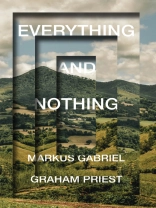Is it possible for reality as a whole to be part of itself? Can the world appear within itself without thereby undermining the consistency of our thought and knowledge-claims concerning more local matters of fact?
This is a question on which Markus Gabriel and Graham Priest disagree. Gabriel argues that the world cannot exist precisely because it is understood to be an absolutely totality. Priest responds by developing a special form of mereology according to which reality is a single all-encompassing whole, everything, which counts itself among its denizens. Their disagreement results in a debate about everything and nothing: Gabriel argues that we experience nothingness once we overcome our urge to contain reality in an all-encompassing thought, whereas Priest develops an account of nothing according to which it is the ground of absolutely everything.
A debate about everything and nothing, but also a reflection on the very possibility of metaphysics.
Table des matières
Preface
Introduction Laureano Ralón
I Essays
1 Everything and Nothing Graham Priest
2 Is There Such a Thing as Everything? Markus Gabriel
3 Some Thoughts on Everything Graham Priest
4 Some Thoughts on “Some Thoughts on Everything” (Which Are not About Everything) Markus Gabriel
II Bonn Discussions
5 Existence
6 Intentionality
7 Non-Wellfoundedness
8 Everything, Nonsense, and Wittgenstein
9 Nothingness
III Postscript Gregory Moss
10 Transcending Everything
A propos de l’auteur
Markus Gabriel holds the chair for Epistemology, Modern and Contemporary Philosophy at the University of Bonn and is also the Director of the International Center for Philosophy in Bonn.
Graham Priest is Distinguished Professor of Philosophy at the CUNY Graduate Center in New York.












